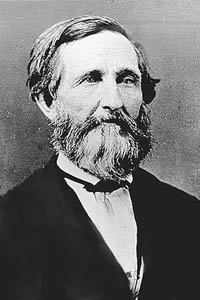Crawford W. Long
| Crawford Long | |
|---|---|

Crawford Long
|
|
| Born |
November 1, 1815 Danielsville, Georgia |
| Died | June 16, 1878 (aged 62) Athens, Georgia |
| Nationality | United States |
| Fields | Medicine |
| Alma mater |
University of Georgia University of Pennsylvania |
| Known for | Anesthesia induced by ether |
Crawford Williamson Long (November 1, 1815 – June 16, 1878) was an American surgeon and pharmacist best known for his first use of inhaled sulfuric ether as an anesthetic.
Long was born in Danielsville,Madison County, Georgia on November 1, 1815.
He received his M.D. degree at the University of Pennsylvania in 1839. After observing the same physiological effects with diethyl ether ("ether") that Humphry Davy had described for nitrous oxide in 1800, Long used ether for the first time on March 30, 1842 to remove a tumor from the neck of a patient, James M. Venable, in Jefferson, Georgia. Long subsequently removed a second tumor from Venable and used ether as an anesthetic in amputations and childbirth. The results of these trials were published in 1849 in The Southern Medical and Surgical Journal. An original copy of this publication is held in the U.S. National Library of Medicine.
Crawford Long was a member of the Demosthenian Literary Society while a student at the University of Georgia and shared a room with Alexander Stephens, Vice President of the Confederate States of America during the American Civil War. Long was a cousin of the western legend Doc Holliday, and may have operated on Doc's cleft lip.
On October 16, 1846, unaware of Long's prior work with ether during surgery, William T. G. Morton administered ether anesthesia before a medical audience at the Massachusetts General Hospital in Boston, Massachusetts. Although Long had informed several surgical colleagues who had similarly administered ether in their practices, Morton is generally credited with the first public demonstration of ether anesthesia. In 1854, Long requested William Crosby Dawson, a U.S. Senator, to present his claims of ether anesthesia discovery to the attention of Congress.
...
Wikipedia
